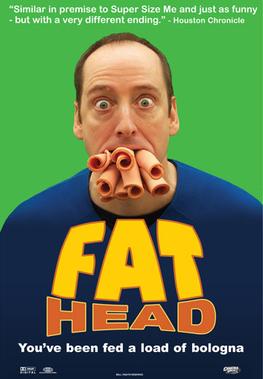Fat Head
Fat Head is a 2009 American documentary film directed by Tom Naughton. The documentary seeks to refute the claims made in the well-known film Super Size Me by Morgan Spurlock. Naughton embarks on a month-long diet consisting mainly of fast food to challenge the results presented in Spurlock's documentary. Fat Head promotes the idea that the large amounts of fat in fast food and other foods are not as harmful as previously believed, and it criticizes the United States Department of Agriculture (USDA) dietary guidelines and the lipid hypothesis, which links saturated fat and cholesterol with heart disease.
Synopsis[edit | edit source]
Fat Head follows Tom Naughton as he aims to demonstrate that it is possible to lose weight and improve health markers on a diet high in saturated fat and low in carbohydrates. Naughton suggests that the obesity epidemic and related health issues are caused not by fast food per se but by a diet high in carbohydrates and the misinformation spread by health authorities regarding nutrition and weight loss. Throughout the documentary, Naughton adheres to a calorie intake of 2,000 to 2,500 calories per day and limits his carbohydrate consumption, resulting in weight loss and improved health metrics.
Criticism of Super Size Me[edit | edit source]
Naughton criticizes Super Size Me for, according to him, misleading viewers about the effects of fast food on health by consuming excessive amounts of food and not exercising. He argues that Spurlock's experiment lacked scientific rigor and that Spurlock's health deterioration could be attributed to overeating rather than the fast food itself.
Discussion on Dietary Guidelines[edit | edit source]
The film also delves into the history and impact of the USDA dietary guidelines, which have long promoted low-fat diets. Naughton claims these guidelines are based on flawed science and have contributed to the rising rates of obesity and diabetes in the United States. He highlights the work of scientists like Gary Taubes and interviews several proponents of low-carbohydrate diets, suggesting that dietary fat, including saturated fat, has been wrongly demonized.
Reception[edit | edit source]
Fat Head received mixed reviews. Supporters praised it for challenging mainstream nutritional advice and for presenting an alternative viewpoint on diet and health. Critics, however, accused it of oversimplifying complex nutritional science and promoting an unhealthy diet. Despite the controversy, Fat Head has found an audience among those skeptical of conventional dietary guidelines and has contributed to ongoing debates about nutrition, obesity, and metabolic health.
Legacy[edit | edit source]
The documentary has had a lasting impact on discussions around diet and health, particularly in the context of the low-carbohydrate and ketogenic diet communities. It has encouraged viewers to question the standard dietary advice and to explore alternative approaches to nutrition and weight loss. Fat Head has also inspired a number of follow-up projects and discussions in various media about the role of government and the food industry in shaping dietary habits.
Search WikiMD
Ad.Tired of being Overweight? Try W8MD's NYC physician weight loss.
Semaglutide (Ozempic / Wegovy and Tirzepatide (Mounjaro / Zepbound) available. Call 718 946 5500.
Advertise on WikiMD
|
WikiMD's Wellness Encyclopedia |
| Let Food Be Thy Medicine Medicine Thy Food - Hippocrates |
Translate this page: - East Asian
中文,
日本,
한국어,
South Asian
हिन्दी,
தமிழ்,
తెలుగు,
Urdu,
ಕನ್ನಡ,
Southeast Asian
Indonesian,
Vietnamese,
Thai,
မြန်မာဘာသာ,
বাংলা
European
español,
Deutsch,
français,
Greek,
português do Brasil,
polski,
română,
русский,
Nederlands,
norsk,
svenska,
suomi,
Italian
Middle Eastern & African
عربى,
Turkish,
Persian,
Hebrew,
Afrikaans,
isiZulu,
Kiswahili,
Other
Bulgarian,
Hungarian,
Czech,
Swedish,
മലയാളം,
मराठी,
ਪੰਜਾਬੀ,
ગુજરાતી,
Portuguese,
Ukrainian
Medical Disclaimer: WikiMD is not a substitute for professional medical advice. The information on WikiMD is provided as an information resource only, may be incorrect, outdated or misleading, and is not to be used or relied on for any diagnostic or treatment purposes. Please consult your health care provider before making any healthcare decisions or for guidance about a specific medical condition. WikiMD expressly disclaims responsibility, and shall have no liability, for any damages, loss, injury, or liability whatsoever suffered as a result of your reliance on the information contained in this site. By visiting this site you agree to the foregoing terms and conditions, which may from time to time be changed or supplemented by WikiMD. If you do not agree to the foregoing terms and conditions, you should not enter or use this site. See full disclaimer.
Credits:Most images are courtesy of Wikimedia commons, and templates, categories Wikipedia, licensed under CC BY SA or similar.
Contributors: Prab R. Tumpati, MD

